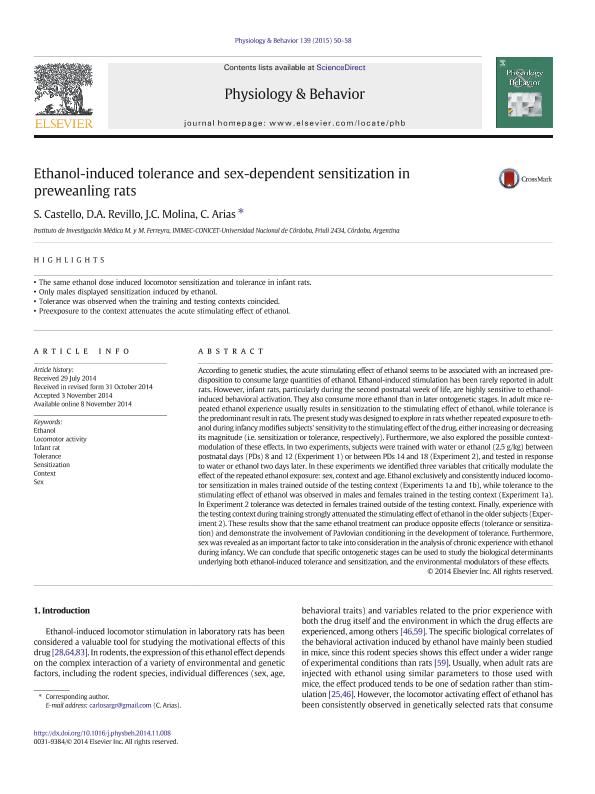Mostrar el registro sencillo del ítem
dc.contributor.author
Castelló, Stefanía Anabel

dc.contributor.author
Revillo, Damian Alejandro

dc.contributor.author
Molina, Juan Carlos

dc.contributor.author
Arias Grandio, Carlos

dc.date.available
2018-03-06T19:02:45Z
dc.date.issued
2015-02
dc.identifier.citation
Castelló, Stefanía Anabel; Revillo, Damian Alejandro; Molina, Juan Carlos; Arias Grandio, Carlos; Ethanol-induced tolerance and sex-dependent sensitization in preweanling rats; Pergamon-Elsevier Science Ltd; Physiology And Behavior; 139; 2-2015; 50-58
dc.identifier.issn
0031-9384
dc.identifier.uri
http://hdl.handle.net/11336/38016
dc.description.abstract
According to genetic studies, the acute stimulating effect of ethanol seems to be associated with an increased predisposition to consume large quantities of ethanol. Ethanol-induced stimulation has been rarely reported in adult rats. However, infant rats, particularly during the second postnatal week of life, are highly sensitive to ethanol-induced behavioral activation. They also consume more ethanol than in later ontogenetic stages. In adult mice repeated ethanol experience usually results in sensitization to the stimulating effect of ethanol, while tolerance is the predominant result in rats. The present study was designed to explore in rats whether repeated exposure to ethanol during infancy modifies subjects' sensitivity to the stimulating effect of the drug, either increasing or decreasing its magnitude (i.e. sensitization or tolerance, respectively). Furthermore, we also explored the possible context-modulation of these effects. In two experiments, subjects were trained with water or ethanol (2.5. g/kg) between postnatal days (PDs) 8 and 12 (Experiment 1) or between PDs 14 and 18 (Experiment 2), and tested in response to water or ethanol two days later. In these experiments we identified three variables that critically modulate the effect of the repeated ethanol exposure: sex, context and age. Ethanol exclusively and consistently induced locomotor sensitization in males trained outside of the testing context (Experiments 1a and 1b), while tolerance to the stimulating effect of ethanol was observed in males and females trained in the testing context (Experiment 1a). In Experiment 2 tolerance was detected in females trained outside of the testing context. Finally, experience with the testing context during training strongly attenuated the stimulating effect of ethanol in the older subjects (Experiment 2). These results show that the same ethanol treatment can produce opposite effects (tolerance or sensitization) and demonstrate the involvement of Pavlovian conditioning in the development of tolerance. Furthermore, sex was revealed as an important factor to take into consideration in the analysis of chronic experience with ethanol during infancy. We can conclude that specific ontogenetic stages can be used to study the biological determinants underlying both ethanol-induced tolerance and sensitization, and the environmental modulators of these effects.
dc.format
application/pdf
dc.language.iso
eng
dc.publisher
Pergamon-Elsevier Science Ltd

dc.rights
info:eu-repo/semantics/openAccess
dc.rights.uri
https://creativecommons.org/licenses/by-nc-sa/2.5/ar/
dc.subject
Context
dc.subject
Ethanol
dc.subject
Infant Rat
dc.subject
Locomotor Activity
dc.subject
Sensitization
dc.subject
Sex
dc.subject
Tolerance
dc.subject.classification
Neurociencias

dc.subject.classification
Medicina Básica

dc.subject.classification
CIENCIAS MÉDICAS Y DE LA SALUD

dc.title
Ethanol-induced tolerance and sex-dependent sensitization in preweanling rats
dc.type
info:eu-repo/semantics/article
dc.type
info:ar-repo/semantics/artículo
dc.type
info:eu-repo/semantics/publishedVersion
dc.date.updated
2018-03-06T17:46:55Z
dc.journal.volume
139
dc.journal.pagination
50-58
dc.journal.pais
Estados Unidos

dc.journal.ciudad
Amsterdam
dc.description.fil
Fil: Castelló, Stefanía Anabel. Consejo Nacional de Investigaciones Científicas y Técnicas. Centro Científico Tecnológico Conicet - Córdoba. Instituto de Investigación Médica Mercedes y Martín Ferreyra. Universidad Nacional de Córdoba. Instituto de Investigación Médica Mercedes y Martín Ferreyra; Argentina
dc.description.fil
Fil: Revillo, Damian Alejandro. Consejo Nacional de Investigaciones Científicas y Técnicas. Centro Científico Tecnológico Conicet - Córdoba. Instituto de Investigación Médica Mercedes y Martín Ferreyra. Universidad Nacional de Córdoba. Instituto de Investigación Médica Mercedes y Martín Ferreyra; Argentina
dc.description.fil
Fil: Molina, Juan Carlos. Consejo Nacional de Investigaciones Científicas y Técnicas. Centro Científico Tecnológico Conicet - Córdoba. Instituto de Investigación Médica Mercedes y Martín Ferreyra. Universidad Nacional de Córdoba. Instituto de Investigación Médica Mercedes y Martín Ferreyra; Argentina
dc.description.fil
Fil: Arias Grandio, Carlos. Consejo Nacional de Investigaciones Científicas y Técnicas. Centro Científico Tecnológico Conicet - Córdoba. Instituto de Investigación Médica Mercedes y Martín Ferreyra. Universidad Nacional de Córdoba. Instituto de Investigación Médica Mercedes y Martín Ferreyra; Argentina
dc.journal.title
Physiology And Behavior

dc.relation.alternativeid
info:eu-repo/semantics/altIdentifier/url/https://linkinghub.elsevier.com/retrieve/pii/S003193841400523X
dc.relation.alternativeid
info:eu-repo/semantics/altIdentifier/doi/http://dx.doi.org/10.1016/j.physbeh.2014.11.008
Archivos asociados
